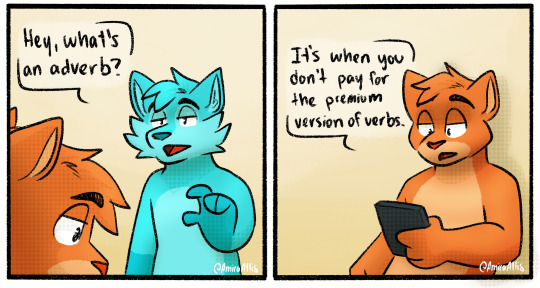#ADVERB
Explore tagged Tumblr posts
Text
Writing Notes: Adverbs
Conjunctive adverbs: accordingly, additionally, also, anyway, besides, certainly, conversely, finally, hence, however, instead, in conclusion, lately, likewise, moreover, namely, nevertheless, so, then, yet
Adverbs of frequency: always, usually, often, sometimes, rarely, never, ever, hardly ever, occasionally, seldom, generally, frequently, normally, once, twice
Adverbs of time: tomorrow, tonight, yesterday, now, then, today, already, daily, last, next, previously, after, afterwards, early, late, later, since, still, just, seldom
Adverbs of manner: well, fast, straight, hard, loudly, proudly, suspiciously, strangely, kindly, easily, rudely, neatly, quickly, generously, eagerly, accidentally, rapidly, hungrily, foolishly, cheerfully, really (can also be adverb of degree in sense of “very”)
Adverbs of degree: lots, somewhat, barely, very, much, most, nearly, too, extremely, enough, so, slightly, especially, just, almost, scarcely, virtually, fully, far, exceptionally
Adverbs of place: behind, above, nearby, backward(s), toward(s), outside, inside, around, over, overseas, close, away, upstairs, downstairs, here, there, everywhere, deeply, next-door
Adverb - a word that modifies a verb, adjective, other adverbs, or adverbial phrases.
The 6 common categories of adverbs are:
conjunctive adverbs
adverbs of frequency
adverbs of time
adverbs of manner
adverbs of degree
adverbs of place
One thing to keep in mind is that there can be some overlap or repetition across the different categories of adverbs, because words can have more than one meaning or use depending on the context.
For example, yet can be a conjunction, meaning “though,” but it can also be an adverb of time, in the sense “in the time still remaining.”
Conjunctive Adverbs
A conjunction is any word that connects words, phrases, clauses, or sentences. They express the relationship between ideas or parts of speech.
A conjunctive adverb is an adverb that acts like a conjunction.
Conjunctive adverbs are often set off from the rest of the sentence by a comma.
For example: We don’t have time to run to the store. Besides, you already have cereal at home.
Conjunctive adverbs can also go at the end of a sentence, in which case they don’t need to be set off with a comma, as in: I didn’t really want a pony anyway.
Adverbs of Frequency
Detail at what rate over time an action or event occurs.
They answer the question “How often?”
Generally go just before the verb they are modifying:
She always orders chocolate cake.
My brother will never get over it.
Adverbs of Time
Describe when things occur.
They answer the question “When?”
Are very flexible: they can go at the beginning of a sentence set off with a comma, right before thea verb or clause they are modifying, or at the end of a sentence. It depends on the adverb and how it is being used in the sentence. For example:
Tomorrow, the class is going to the zoo.
We last saw her before dinner.
Are you going to Paris next?
Adverbs of Manner
Manner here means “a way of doing, being done, or happening.”
Answer the question “How?”
Can go before or after the verb or phrase they are modifying. For example:
The students quickly ate their lunches.
Our mayor spoke loudly and authoritatively.
Adverbs of Degree
Describe intensity or quantity of an action.
Answer the question “How much?”
Typically go before the verb or part of speech being modified. For example:
We were too hungry to talk during the meal.
The little puppy was extremely energetic.
Adverbs of Place
Describe location.
They answer the question “Where?”
Typically go after the verb or other part of the speech they are modifying. For example:
I think your sister is upstairs.
Go toward the big tree, then make a left.
Source ⚜ More: Writing Notes & References ⚜ Writing Resources PDFs
#adverb#writing reference#writeblr#writers on tumblr#spilled ink#dark academia#literature#creative writing#writing prompt#poets on tumblr#grammar#langblr#words#lit#writing#writing resources
303 notes
·
View notes
Text
18 notes
·
View notes
Text

Verb Plus+
#furry#furry sfw#furry art#art#comic#verb#adverb#amiraallis comic#this is essentially what Google has become
19 notes
·
View notes
Text
I will never be able to explain how much this made me laugh

3 notes
·
View notes
Text
Doşóluolu WOTD day 24:
noc /nok/
numeral: one
article: a/an
adverb: only; merely; solely
2 notes
·
View notes
Text

In 1999, while filming Gladiator (2000) in Malta, Oliver Reed drank EIGHT pints of beer, TWELVE double rums and FOURTEEN whiskies in a pub in Valleta. After the drinking contest with five sailors, he suffered a sudden heart attack.
The bar changed its name to “Ollie’s Last Pub”.
Some scenes in the film had to be finished with computer graphics, increasing the budget by 3 million dollars.
The film was dedicated to his memory.
#gerund#gladiator#trolleng#trolledu#gerunds#passive#passive voice#the passive#adv#adv.#adverb#adverbs and gerunds#past simple#ing adj#ing adjs#ing adjectives#have to#had to#have to do#had to do#semi modal#semi modals#semi modal verbs
2 notes
·
View notes
Text
Today's word of the day is...
Amain
[Adverb]
Definition: With great haste.*
*Note: An old/archaic term.
Example Sentence: Come, amain!
2 notes
·
View notes
Note
Verb
proper noun purposefully uncapitalized
9 notes
·
View notes
Text
Word already in the dictionary: Tumblr, did
Found words: 13
Not
Adverb
Used with an auxiliary verb or “be” to form the negative. "He would not say"
Used as a short substitute for a negative clause. "Maybe I'll regret it, but I hope not"
Noun [ELECTRONICS]
A Boolean operator with only one variable that has the value one when the variable is zero and vice versa.
Adjective [ART]
(of paper) Not hot-pressed, and having a slightly textured surface.
Goncharov
Meme
Goncharov is an Internet meme surrounding a nonexistent 1973 mafia film of the same name. Goncharov was imagined by Tumblr users as a joke, often with the tagline "the greatest mafia movie ever made". It is usually described as a mafia film set in Naples, with the involvement of director Martin Scorsese. Those discussing the film have devised a fictionalized cast including Robert De Niro, Al Pacino, John Cazale, Gene Hackman, Cybill Shepherd and Harvey Keitel.
Poob
Verb
To drop, fall down, fall from a height.
Is
Verb
Present tense third-person singular of be.
Glupp
Onomatopoeia
The sound of swallowing.
Shittoing
Slang
"Shittoing" is a vulgar slang term, essentially meaning the act of defecating. It's a less formal, often more crude, way to say "pooping" or "defecating".
Tubi, Pluto, Roku Channel, Hulu
Services
All of these are the names of streaming services you can access online.
Etc.
Adverb
Used at the end of a list to indicate that further, similar items are included."protect seedling from damage caused by feet, lawnmowers, pets, etc."
Tumblr did not “Goncharov” Poob. Poob is Glupp Shittoing Tubi/Pluto/Roku Channel/Hulu/etc.
#oxford dictionary#found words#not#goncharov#poob#is#glupp#shittoing#tubi#pluto#roku channel#hulu#etc.#adverb#noun#adjective#meme#verb#onomatopoeia#slang#services
53K notes
·
View notes
Note
When is it okay to use adverbs? I'm currently paranoid and pondering about deleting every single one from my wips
Here are excerpts of writing tips and advice from editors, publishers, and writers:
Adverbs in your novel must be minimal.
Adverbs are necessary for the English language and have a rightful place as one of the eight parts of speech.
In literature, some adverbs are less desirable than others.
Adverbs with -ly tend to slow the pace.
They also tell what’s happening. They don’t show.
Never use an adverb to modify the verb 'said' —Elmore Leonard
Stephen King:
The adverb is not your friend.
Adverbs, you will remember from your own version of Business English, are words that modify verbs, adjectives, or other adverbs.
They’re the ones that usually end in -ly.
Adverbs, like the passive voice, seem to have been created with the timid writer in mind.
With adverbs, the writer usually tells us he or she is afraid he/she isn’t expressing himself/herself clearly, that he or she is not getting the point or the picture across.
Consider the sentence He closed the door firmly.
It’s by no means a terrible sentence (at least it’s got an active verb going for it), but ask yourself if firmly really has to be there. You can argue that it expresses a degree of difference between He closed the door and He slammed the door, and you’ll get no argument from me . . . but what about context? What about all the enlightening (not to say emotionally moving) prose which came before He closed the door firmly? Shouldn’t this tell us how he closed the door? And if the foregoing prose does tell us, isn’t firmly an extra word? Isn’t it redundant?
Someone out there is now accusing me of being tiresome and anal-retentive. I deny it. I believe the road to hell is paved with adverbs, and I will shout it from the rooftops. To put it another way, they’re like dandelions. If you have one on your lawn, it looks pretty and unique. If you fail to root it out, however, you find five the next day . . . fifty the day after that . . . and then, my brothers and sisters, your lawn is totally, completely, and profligately covered with dandelions. By then you see them for the weeds they really are, but by then it’s—GASP!!—too late. I can be a good sport about adverbs, though. Yes I can. With one exception: dialogue attribution. I insist that you use the adverb in dialogue attribution only in the rarest and most special of occasions . . . and not even then, if you can avoid it.
There is a core simplicity to the English language and its American variant, but it’s a slippery core. All I ask is that you do as well as you can, and remember that, while to write adverbs is human, to write he said or she said is divine.
Sources: 1 2 3 ⚜ Writing Refresher: Adjective or Adverb
Hope this helps! Some sound advice here from different perspectives. Definitely choose which ones are most appropriate for you, as a writer, and for the specific story you are currently working on. I'd also recommend you read the entire sources to get a fuller context since these are just excerpts I handpicked. And because more examples are provided as well, particularly in Stephen King's book.
"Since advice is usually ignored and rules are routinely broken, I refer to these little pearls as merely 'suggestions.'....There’s nothing binding here. All suggestions can be ignored when necessary." —John Grisham
#anonymous#on writing#adverb#writeblr#dark academia#spilled ink#stephen king#writing tips#writing advice#grammar#langblr#writers on tumblr#writing reference#elmore leonard#john grisham#writing prompt#poets on tumblr#poetry#writing resources
81 notes
·
View notes
Text
Word of the day:
Anygays
Adverb [INFORMAL - DIALECT]
A misspelling of the word 'anyways' made by @red-solo-cup-offical in the Offical Officalverse Discord server. Red solo cup canonised the word 1 minute later, after @duck-offical's suggestion to make it a word.
"Anygays, I'm about to pass out"
Origin: Anyways
Adverb [INFORMAL - DIALECT]
Nonstandard form of anyway.
"You wouldn't understand all them long words anyways"
15 notes
·
View notes
Text
Doşóluolu WOTD day 23:
sóş /sɔʃ/
numeral: zero
particle: no
adverb: not
2 notes
·
View notes
Photo

#trolleng#trolledu#speaking#reading#gerund#the gerund#preposition#adverb#prepositions activate gerunds
286K notes
·
View notes
Text
"I know adverbs are controversial, but "said softly" means something different than 'whispered' and this is the hill I will die on."
#books#writing#writersnetwork#writers#writers on tumblr#writing community#author#writerscommunity#writers life#creative writing#writer#writers of tumblr#adverbs#requote#unknown quote
76K notes
·
View notes
Text
Word of the day:
Right
Adjective
Morally good, justified, or acceptable.
"I hope we're doing the right thing"
True or correct as a fact.
"I'm not sure I know the right answer"
Adverb
To the furthest or most complete extent or degree (used for emphasis).
"The car spun right off the track"
Correctly.
"He had guessed right"
Noun
That which is morally correct, just, or honorable.
"She doesn't understand the difference between right and wrong"
A moral or legal entitlement to have or obtain something or to act in a certain way.
"She had every right to be angry"
Verb
Restore to a normal or upright position.
"We righted the capsized dinghy"
Exclamation [INFORMAL]
Used to indicate one's agreement or to acknowledge a statement or order.
"“Barry's here.” “Oh, right”"
3 notes
·
View notes